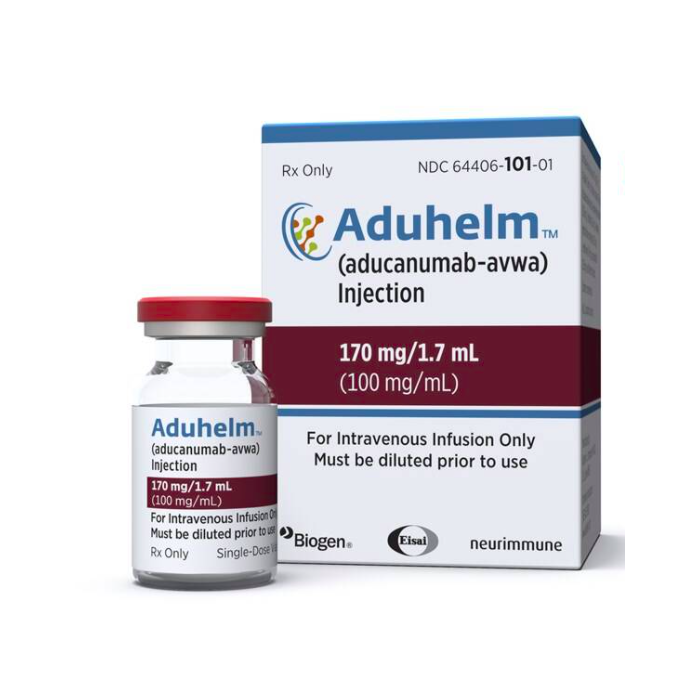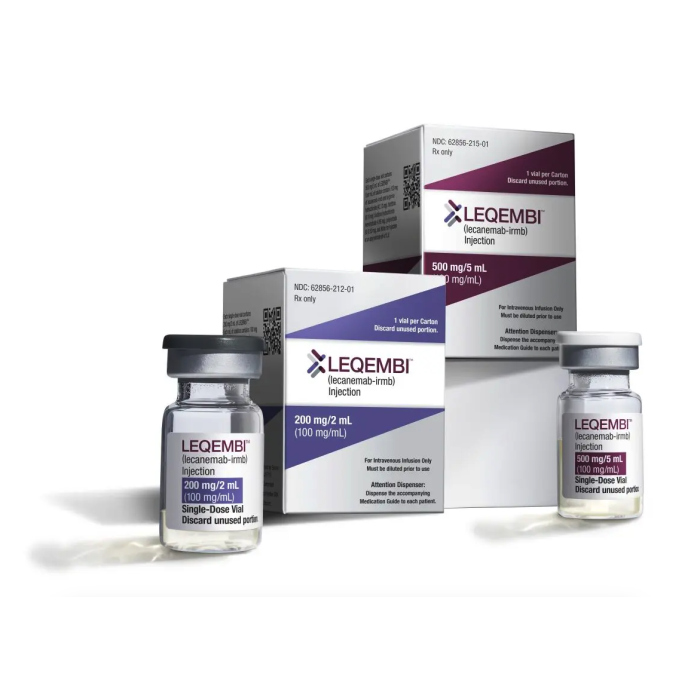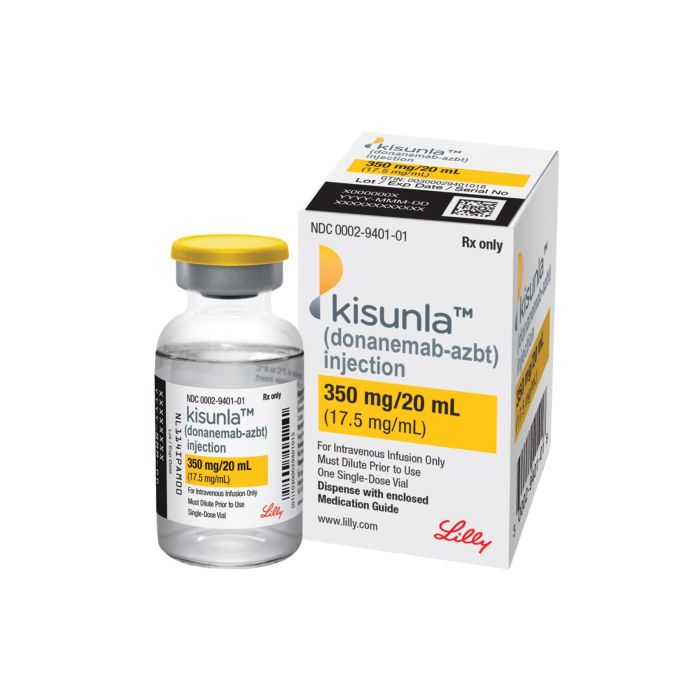Breakthrough or hype? A simple look at anti-amyloid therapy for Alzheimer's disease.
Last updated: 19 November 2024

You can legally access new medicines, even if they are not approved in your country.
Learn howAlzheimer's disease is a devastating disease. It is projected to affect about 152 million people worldwide by 2050 [1]. The condition causes cognitive decline and memory loss. These symptoms worsen over time and interfere with daily activities.
Finding a treatment for Alzheimer's disease has been and still is a major challenge for medicine. Anti-amyloid therapies have recently emerged as a potential treatment option for Alzheimer's.
But what are they? In this article, we'll help you understand what amyloid therapies are. We'll also look at which ones are available and what's in development.
Beta-amyloid in Alzheimer's Disease
It's still largely unknown what causes the cognitive decline associated with Alzheimer's disease. One of the main theories is "the amyloid hypothesis" [4]. According to it, Alzheimer's is triggered by issues with the production, accumulation, and disposal of beta-amyloid [4].
Beta-amyloid is a part of a larger protein called amyloid precursor protein (APP). Under normal circumstances, it plays a role in neural growth and repair. However, with age, fragments of the beta-amyloid protein can build up in the brain. They form the so-called amyloid plaques. These plaques disrupt cell functions and lead to the death of nerve cells [2].
Some studies suggest that amyloid plaques cause nerve cell toxicity in Alzheimer's. Newer studies show that the soluble aggregates of beta-amyloid may be more toxic than the insoluble plaques [4]. There is a lot to learn about how beta-amyloids contribute to cognitive decline. However, the fact that they play a role in Alzheimer's is well-documented.
In this context, many scientists are targeting beta-amyloids to find Alzheimer's medication. The result of these efforts is anti-amyloid therapy.
What is anti-amyloid therapy?
It focuses on blocking the effects of beta-amyloid in the brain. A number of such treatments have been tested in recent years, with mixed success.
There are several approaches which an anti-amyloid therapy can take:
- Decreasing the production of beta-amyloid.
Some experimental drugs have tried to change the behavior of proteins that cut APP into beta-amyloid. These proteins are called secretases. Modifying their behavior can prevent or decrease the production of beta-amyloid. Anti-amyloid therapies focusing on this approach are called "secretase inhibitors" [4]. Recent studies on beta-secretase inhibitors have not been encouraging. Results didn't show an effect in slowing cognitive decline. There were also significant side effects [6].
- Preventing beta-amyloid buildup.
Some studies suggest that beta-amyloid's toxic effects occur before the formation of plaques. More specifically, during the initial interaction between beta-amyloid and nerve cells. Researchers are looking into ways to prevent this initial interaction [4].
- Increasing the removal of beta-amyloid.
This can be done by targeting it with monoclonal antibodies. Or, through vaccines who train the immune system to identify and remove amyloid plaques [4].
What anti-amyloid therapies for Alzheimer's are approved?
There are multiple different anti-amyloid therapies in development. However, only two are currently approved for the treatment of early-stage Alzheimer's disease:
- Aduhelm (aducanumab).
Aduhelm was the first Alzheimer's medicine in 18 years to get FDA approval [9]. Unlike previous medicines used in treating the disease, Aduhelm isn't a symptomatic treatment. Instead, it aims to change the course of the disease by breaking down beta-amyloid plaques and slowing cognitive decline [8]. Aduhelm's approval has been surrounded by a lot of controversy. Many medical professionals have expressed doubts about the drug's clinical benefits [10]. In the aftermath of this controversy, Aduhelm's manufacturer Biogen withdrew its marketing authorization application to the EMA [11].
This monoclonal antibody medicine was granted accelerated approval by the FDA in January 2023 [12]. Leqembi works similarly to Aduhelm (although there are some differences). Based on its clinical trial results, Leqembi appears to slow cognitive decline by as much as 27% [13]. There are doubts whether clinical benefits justify the possible adverse effects of the drug [14, 15]. It took until 2024 for Leqembi to get approval in the UK and the EU.
Similar to Leqembi, donanemab is a monoclonal antibody that aims to remove amyloid plaques from the brain, thus delaying cognitive decline. The two medicines work in a similar way, but attack a different part of the amyloid molecule. Clinical trial data has shown that Leqembi and Kisunla can slow cognitive decline by up to 27% and up to 35% over 18 months, respectively. As of November 2024, Kisunla (donanemab) is only approved in the USA. Its marketing authorization application is under review by the EMA.
Upcoming anti-amyloid therapies for Alzheimer's
Below are some of the anti-amyloid therapies currently in development. As clinical trial results become available, we'll know more about their potential:
- Gantenerumab. Another monoclonal antibody. Gantenerumab targets existing amyloid plaques. It also aims to prevent the formation of new plaques [18]. Gantenerumab completed its Phase 3 clinical trial in November 2022. Unfortunately, it failed to show the expected clinical benefit of slowing cognitive decline in patients [19].
- Solanezumab. This monoclonal antibody targets the soluble form of beta-amyloid. It's considered more toxic to synaptic function than the insoluble plaques [20]. Unfortunately, the results of a recent clinical trial did not show any effect on cognitive decline in patients [21].
- Anti-amyloid vaccines. There are currently several anti-amyloid vaccines in early development stages. Including ALZ-101, ABvac40, and UB-311. It remains to be seen if they could play a meaningful role in Alzheimer's treatment [7].
At what stage of Alzheimer's is anti-amyloid therapy used?
The currently approved anti-amyloid medicines for Alzheimer's are intended for early-stage patients. In these patients, there is mild cognitive impairment.
Leqembi is currently included in the AHEAD clinical trial. It aims to study the efficacy of the drug if used even earlier. More specifically, in pre-symptomatic individuals with an elevated beta-amyloid presence [5].
There is currently no anti-amyloid therapy approved for use in later stages of Alzheimer's.
Final words on anti-amyloid therapy for Alzheimer's disease
Anti-amyloid treatments are just one type of Alzheimer's treatment options currently in development. Anti-amyloid therapies are based on the amyloid hypothesis and target amyloid deposits in the brain. The benefit of these therapies is that they can potentially slow down the loss of cognitive function.
Monoclonal antibody treatments such as Leqembi and Aduhelm are also associated with risks. More specifically, the potential for side effects such as swelling of the brain, which may lead to adverse outcomes.
We at Everyone.org will always be looking for the latest developments and approvals to fight or, hopefully in the future, cure Alzheimer’s, because we know first-hand how Alzheimer’s affects lives of loved ones.
In the meantime the jury is still out on whether the currently FDA-approved Alzheimer’s medicines Leqembi and Aduhelm are a breakthrough or a hype. The long wait for further medicine approvals can discourage many Alzheimer’s patients that could potentially benefit from these drugs.
Are Aduhelm, Kisunla, or Leqembi not (yet) approved in your country but do you and your doctor want to give them a try? You don't have to wait. Our team can help you access them safely and legally, as long as you have a doctor's prescription. Contact us to find out more.
REFERENCES:
- Ries, Miriam, and Magdalena Sastre. Global, regional, and national burden of Alzheimer's disease and other dementias, 1990–2019. Frontiers, 10 October 2022.
- What Happens to the Brain in Alzheimer's Disease?, National Institute on Aging, 22 June 2023.
- Blood test may find early signs of Alzheimer's. Harvard Health, 1 November 2019.
- Beta-amyloid and the Amyloid Hypothesis, Alzheimer's Association, Accessed 26 June 2023.
- AHEAD 3-45 Study: A Study to Evaluate Efficacy and Safety of Treatment With Lecanemab in Participants With Preclinical Alzheimer's Disease and Elevated Amyloid and Also in Participants With Early Preclinical Alzheimer's Disease and Intermediate ... ClinicalTrials.gov, 13 July 2020.
- Alzheimer's treatments: What's on the horizon?, Mayo Clinic, 20 May 2023.
- Amin, Shilpa, and Sophia Smith. Alzheimer's Vaccine: In Development, Clinical Trials, and Availability., Healthline, 18 May 2022.
- ADUHELM® (aducanumab-avwa) | Official Patient Site, Accessed 26 June 2023.
- Aducanumab (marketed as Aduhelm) Information, FDA, 8 July 2021.
- Helmore, Edward. FDA under fire over approval of Alzheimer's drug Aduhelm., The Guardian, 29 December 2022.
- Aduhelm: Withdrawn application | European Medicines Agency., European Medicines Agency, Accessed 26 June 2023.
- FDA Grants Accelerated Approval for Alzheimer's Disease Treatment., FDA, 6 January 2023.
- Lecanemab in Early Alzheimer's disease., The New England Journal of Medicine, 05 January 2023.
- The anti-amyloid monoclonal antibody Lecanemab: 16 cautionary notes., Zenodo, 3 January 2023.
- Grover, Natalie. European Alzheimer's experts unconvinced by new Eisai, Biogen drug., Reuters, 13 June 2023.
- Donanemab | ALZFORUM., Alzforum, 10 May 2023.
- A Study of Donanemab (LY3002813) in Participants With Early Alzheimer's Disease (TRAILBLAZER-ALZ 2) - Full Text View., ClinicalTrials.gov, Accessed 26 June 2023.
- Gantenerumab | ALZFORUM., Alzforum, 6 January 2023.
- Roche announces results from the GRADUATE Phase III trials of gantenerumab., Alzheimer Europe, 14 November 2022.
- Solanezumab | ALZFORUM., Alzforum, 4 August 2021.
- Lilly Provides Update on A4 Study of Solanezumab for Preclinical Alzheimer's Disease | Eli Lilly and Company., Investors, 8 March 2023.







